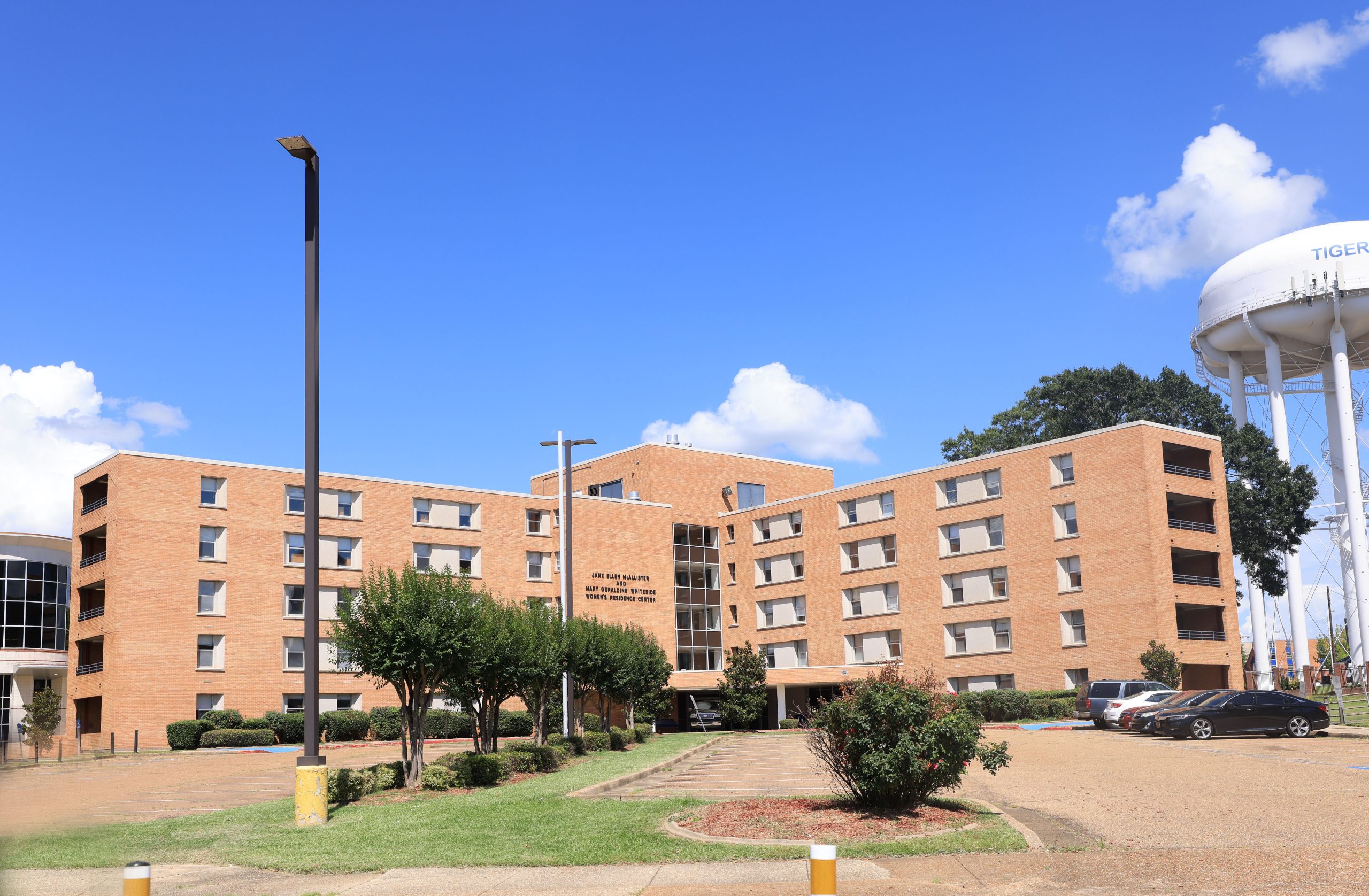Mississippi Today
JSU years away from solving housing needs but working on it

It will likely be years before Jackson State University secures enough funding to fix its housing shortage as efforts are underway to seek legislative support in the absence of a deep-welled endowment.
The university is estimated to lack 1,600 beds, according to the new director of campus operations.
Jackson State’s funding needs, which appears to be the largest bond request any university submitted to the Institutions of Higher Learning Board of Trustees, totals more than $136 million for water infrastructure improvements, renovation of a dorm that’s been offline for two years, and the construction of a new residence hall, according to budget documents.
Some of that money has already been granted to Jackson State, but it’s unclear how much. Last year, the university got $15 million in legislative funding mainly for repairs and renovations.
The total amount of state support that Jackson State has received in the last 10 years is a little more than $56 million, according to the university.
There are manifold reasons for this gap between Jackson State’s financial need and the amount of money the historically Black university can realistically expect to receive in state funding, according to lawmakers and university officials.
Those include but are not limited to the continuation of historical underfunding, an anti-Jackson bias, the university’s recent presidential turnover and the relative lack of Jackson State alums at the Capitol who can independently advocate for the university outside the system-wide lobbying efforts undertaken by IHL.
“Anything that had the word ‘Jackson’ leading into a request was looked at with askance,” said Sen. John Horhn, D-Jackson. “Unfortunately I think the university may have been victimized by association.”
Some feel the university has made clear that its infrastructure needs help are beginning to negatively impact its enrollment. After the Jackson water crisis last fall left students living on campus without air conditioning or functioning bathrooms, the university’s enrollment fell by 1%. JSU’s fall enrollment was 6,906 students, according to IHL.
“It’s all on the Senate, IHL and everybody else,” said Rep. Chris Bell, D-Jackson.
IHL maintains its four-year funding bond process, which is based on historical state support, helps like-sized universities receive equitable funding. Still, the state’s three largest predominantly white institutions — University of Mississippi, Mississippi State University and the University of Southern Mississippi — come out on top.
As a system, a spokesperson wrote via email, IHL lobbies for all eight institutions each session.
“As the state’s urban research university located in the Capital City, Jackson State has a unique mission and a rich history of academic excellence and community engagement,” wrote Kim Gallaspy, assistant commissioner for government relations at IHL. “The additional state support we have received in the past few sessions is evidence that Legislators recognize the value of the university system, including JSU.”
For HBCUs across the country, underfunding persists on a systemic level, not because of any one university president or government agency, said Andre Perry, a senior fellow at Brookings Metro whose research focuses on race and structural inequality.
“These issues are long standing and durable, and they will require durable movements in response,” Perry said. “It’s not gonna be one piece of legislation or you know, a savior or a football coach that brings funding to Jackson State. It will be a sustained movement because the movement to deny black institutions is such.”
Jackson State’s new executive director of campus operations, Vance Siggers, has a different perspective. He said the university needed to take ownership of projects that were in its control and make sure lawmakers were receiving a clear message about the importance of student housing vis-a-vis a new stadium.
Housing “is the biggest priority,” he said. “Not ‘one of’ — ‘the.’ And that’s not the message that was received (by lawmakers).”
Siggers said he has been working to change that. Last month, he took lawmakers on a tour of the campus facilities. This is done every year, but Siggers said he conducted the largest tour in a decade, inviting faculty and staff.
“There is a new breeze blowing on campus,” he said.
One of the stops included McAllister Whiteside, a female dormitory that has been offline since 2021 due to mechanical, electrical and utility failures and equipment that needs to be repaired. The university is hoping to revamp it into a suite-style apartments with $20 million in state funding, some of which it has already received.
“The way your campus looks is your front porch,” he said. “When you see a house with a neat front porch, you see a house that is welcoming. Nine times out of 10 you say that’s probably a pretty good house to visit. If the yard is out of control and you have weeds and all that time of stuff — I don’t know what the situation is at that house but a lot of times you’d say they need to do some tuning in there.”
Jackson State is also seeking funding to build new dorms on land the university recently acquired from its development foundation, a sale that has been in the works for years. The new housing would significantly reduce the university’s backlog, Siggers said.
But the plan is reminiscent of a failed 2014 plan to build a $47 million dorm complex on campus.
Put on hold by the IHL board after Carolyn Meyers resigned in 2016 amid the university’s plummeting finances, the project is one of several campus upgrades that have been proposed, only to hit some kind of roadblock. The university and some supportive lawmakers considered pursuing a public-private partnership, but that did not materialize.
So what’s different about this time? The leadership, Siggers said.
“(Elayne) Hayes-Anthony is Jackson State,” he said. “She’s done so much for the state of Mississippi. She’s done so much for this nation. And there are a lot of people out there cheering.”
It’s not clear yet if Hayes-Anthony will become the university’s next permanent president. Last month, the only JSU alumnus on the board voted against allowing her to apply for the role.
This article first appeared on Mississippi Today and is republished here under a Creative Commons license.
Did you miss our previous article…
https://www.biloxinewsevents.com/?p=287429
Mississippi Today
A win for press freedom: Judge dismisses Gov. Phil Bryant’s lawsuit against Mississippi Today
Madison County Circuit Court Judge Bradley Mills dismissed former Gov. Phil Bryant’s defamation lawsuit against Mississippi Today on Friday, ending a nearly two-year case that became a beacon in the fight for American press freedom.
For the past 22 months, we’ve vigorously defended our Pulitzer Prize-winning reporting and our characterizations of Bryant’s role in the Mississippi welfare scandal. We are grateful today that the court, after careful deliberation, dismissed the case.
The reporting speaks for itself. The truth speaks for itself.
This judgment is so much more than vindication for Mississippi Today — it’s a monumental victory for every single Mississippian. Journalism is a public good that all of us deserve and need. Too seldom does our state’s power structure offer taxpayers true government accountability, and Mississippians routinely learn about the actions of their public officials only because of journalism like ours. This reality is precisely why we launched our newsroom nine years ago, and it’s why we devoted so much energy and spent hundreds of thousands of dollars defending ourselves against this lawsuit. It was an existential threat to our organization that took time and resources away from our primary responsibilities — which is often the goal of these kinds of legal actions. But our fight was never just about us; it was about preserving the public’s sacred, constitutional right to critical information that journalists provide, just as our nation’s Founding Fathers intended.
Mississippi Today remains as committed as ever to deep investigative journalism and working to provide government accountability. We will never be afraid to reveal the actions of powerful leaders, even in the face of intimidation or the threat of litigation. And we will always stand up for Mississippians who deserve to know the truth, and our journalists will continue working to catalyze justice for people in this state who are otherwise cheated, overlooked, or ignored.
We appreciate your support, and we are honored to serve you with the high quality, public service journalism you’ve come to expect from Mississippi Today.
READ MORE: Judge Bradley Mills’ order dismissing the case
READ MORE: Mississippi Today’s brief in support of motion to dismiss
This article first appeared on Mississippi Today and is republished here under a Creative Commons Attribution-NoDerivatives 4.0 International License.
Mississippi Today
Meet Willye B. White: A Mississippian we should all celebrate
In an interview years and years ago, the late Willye B. White told me in her warm, soothing Delta voice, “A dream without a plan is just a wish. As a young girl, I had a plan.”
She most definitely did have a plan. And she executed said plan, as we shall see.
And I know what many readers are thinking: “Who the heck was Willye B. White?” That, or: “Willye B. White, where have I heard that name before?”
Well, you might have driven an eight-mile, flat-as-a-pancake stretch of U.S. 49E, between Sidon and Greenwood, and seen the marker that says: “Willye B. White Memorial Highway.” Or you might have visited the Olympic Room at the Mississippi Sports Hall of Fame and seen where White was a five-time participant and two-time medalist in the Summer Olympics as a jumper and a sprinter.
If you don’t know who Willye B. White was, you should. Every Mississippian should. So pour yourself a cup of coffee or a glass of iced tea, follow along and prepare to be inspired.
Willye B. White was born on the last day of 1939 in Money, near Greenwood, and was raised by grandparents. As a child, she picked cotton to help feed her family. When she wasn’t picking cotton, she was running, really fast, and jumping, really high and really long distances.
She began competing in high school track and field meets at the age of 10. At age 11, she scored enough points in a high school meet to win the competition all by herself. At age 16, in 1956, she competed in the Summer Olympics at Melbourne, Australia.
Her plan then was simple. The Olympics, on the other side of the world, would take place in November. “I didn’t know much about the Olympics, but I knew that if I made the team and I went to the Olympics, I wouldn’t have to pick cotton that year. I was all for that.”
Just imagine. You are 16 years old, a high school sophomore, a poor Black girl. You are from Money, Mississippi, and you walk into the stadium at the Melbourne Cricket Grounds to compete before a crowd of more than 100,000 strangers nearly 10,000 miles from your home.
She competed in the long jump. She won the silver medal to become the first-ever American to win a medal in that event. And then she came home to segregated Mississippi, to little or no fanfare. This was the year after Emmett Till, a year younger than White, was brutally murdered just a short distance from where she lived.
“I used to sit in those cotton fields and watch the trains go by,” she once told an interviewer. “I knew they were going to some place different, some place into the hills and out of those cotton fields.”
Her grandfather had fought in France in World War I. “He told me about all the places he saw,” White said. “I always wanted to travel and see the places he talked about.”
Travel, she did. In the late 1950s there were two colleges that offered scholarships to young, Black female track and field athletes. One was Tuskegee in Alabama, the other was Tennessee State in Nashville. White chose Tennessee State, she said, “because it was the farthest away from those cotton fields.”
She was getting started on a track and field career that would take her, by her own count, to 150 different countries across the globe. She was the best female long jumper in the U.S. for two decades. She competed in Olympics in Melbourne, Rome, Tokyo, Mexico City and Munich. She would compete on more than 30 U.S. teams in international events. In 1999, Sports Illustrated named her one of the top 100 female athletes of the 20th century.
Chicago became White’s home for most of adulthood. This was long before Olympic athletes were rich, making millions in endorsements and appearance fees. She needed a job, so she became a nurse. Later on, she became an public health administrator as well as a coach. She created the Willye B. White Foundation to help needy children with health and after school care.
In 1982, at age 42, she returned to Mississippi to be inducted into the Mississippi Sports Hall of Fame and was welcomed back to a reception at the Governor’s Mansion by Gov. William Winter, who introduced her during induction ceremonies. Twenty-six years after she won the silver medal at Melbourne, she called being hosted and celebrated by the governor of her home state “the zenith of her career.”
Willye B. White died of pancreatic cancer in a Chicago hospital in 2007. While working on an obituary/column about her, I talked to the late, great Ralph Boston, the three-time Olympic long jump medalist from Laurel. They were Tennessee State and U.S. Olympic teammates. They shared a healthy respect from one another, and Boston clearly enjoyed talking about White.
At one point, Ralph asked me, “Did you know Willye B. had an even more famous high school classmate.”
No, I said, I did not.
“Ever heard of Morgan Freeman?” Ralph said, laughing.
Of course.
“I was with Morgan one time and I asked him if he ever ran track,” Ralph said, already chuckling about what would come next.
“Morgan said he did not run track in high school because he knew if he ran, he’d have to run against Willye B. White, and Morgan said he didn’t want to lose to a girl.”
This article first appeared on Mississippi Today and is republished here under a Creative Commons Attribution-NoDerivatives 4.0 International License.![]()
Mississippi Today
Early voting proposal killed on last day of Mississippi legislative session
Mississippi will remain one of only three states without no-excuse early voting or no-excuse absentee voting.
Senate leaders, on the last day of their regular 2025 session, decided not to send a bill to Gov. Tate Reeves that would have expanded pre-Election Day voting options. The governor has been vocally opposed to early voting in Mississippi, and would likely have vetoed the measure.
The House and Senate this week overwhelmingly voted for legislation that established a watered-down version of early voting. The proposal would have required voters to go to a circuit clerk’s office and verify their identity with a photo ID.
The proposal also listed broad excuses that would have allowed many voters an opportunity to cast early ballots.
The measure passed the House unanimously and the Senate approved it 42-7. However, Sen. Jeff Tate, a Republican from Meridian who strongly opposes early voting, held the bill on a procedural motion.
Senate Elections Chairman Jeremy England chose not to dispose of Tate’s motion on Thursday morning, the last day the Senate was in session. This killed the bill and prevented it from going to the governor.
England, a Republican from Vancleave, told reporters he decided to kill the legislation because he believed some of its language needed tweaking.
The other reality is that Republican Gov. Tate Reeves strongly opposes early voting proposals and even attacked England on social media for advancing the proposal out of the Senate chamber.
England said he received word “through some sources” that Reeves would veto the measure.
“I’m not done working on it, though,” England said.
Although Mississippi does not have no-excuse early voting or no-excuse absentee voting, it does have absentee voting.
To vote by absentee, a voter must meet one of around a dozen legal excuses, such as temporarily living outside of their county or being over 65. Mississippi law doesn’t allow people to vote by absentee purely out of convenience or choice.
Several conservative states, such as Texas, Louisiana, Arkansas and Florida, have an in-person early voting system. The Republican National Committee in 2023 urged Republican voters to cast an early ballot in states that have early voting procedures.
Yet some Republican leaders in Mississippi have ardently opposed early voting legislation over concerns that it undermines election security.
This article first appeared on Mississippi Today and is republished here under a Creative Commons license.
.
-

 Mississippi Today4 days ago
Mississippi Today4 days agoPharmacy benefit manager reform likely dead
-

 News from the South - Kentucky News Feed5 days ago
News from the South - Kentucky News Feed5 days agoTornado practically rips Bullitt County barn in half with man, several animals inside
-

 News from the South - Alabama News Feed5 days ago
News from the South - Alabama News Feed5 days ago'I think everybody's concerned': Mercedes-Benz plant eyeing impact of imported vehicle tariffs
-

 News from the South - Oklahoma News Feed7 days ago
News from the South - Oklahoma News Feed7 days agoLife of David Boren memorialized in ceremony attended by hundreds
-

 News from the South - Missouri News Feed6 days ago
News from the South - Missouri News Feed6 days agoThunderstorms drench areas south of St. Louis
-

 News from the South - Alabama News Feed6 days ago
News from the South - Alabama News Feed6 days ago41st annual Bloomin Festival Arts and Crafts Fair (April 5 & 6) | March 31, 2025 | News 19 at 9 a.m.
-

 News from the South - Florida News Feed4 days ago
News from the South - Florida News Feed4 days agoFlorida special election results: GOP keeps 2 U.S. House seats in Florida
-

 News from the South - Louisiana News Feed4 days ago
News from the South - Louisiana News Feed4 days agoMother turns son's tragedy into mental health mission













































